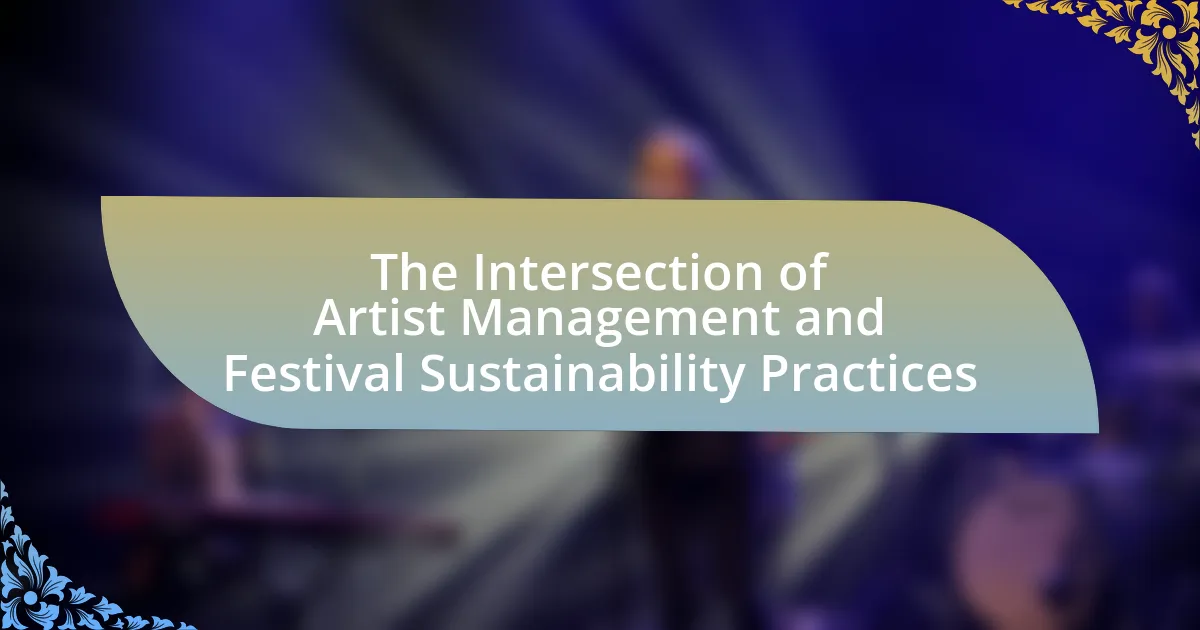The article focuses on the financial aspects of artist management for festivals, highlighting key elements such as budgeting, artist fees, revenue sharing, and the impact of financial considerations on artist selection and management. It discusses the financial responsibilities of artist managers, including budgeting, financial planning, and revenue management, while also examining the sources of revenue like ticket sales, merchandise, and sponsorships. Additionally, the article addresses the costs associated with artist management, common financial pitfalls, and best practices for achieving financial success, emphasizing the importance of effective financial planning and diversification of income streams in sustaining artist careers within the festival context.

What are the Financial Aspects of Artist Management for Festivals?
The financial aspects of artist management for festivals primarily involve budgeting, artist fees, and revenue sharing. Budgeting is crucial as it determines how much can be allocated for artist payments, production costs, and marketing expenses. Artist fees can vary significantly based on their popularity and market demand; for instance, top-tier artists may command fees ranging from tens of thousands to millions of dollars. Revenue sharing agreements are also essential, as they outline how ticket sales, merchandise, and sponsorship revenues are divided between the festival organizers and the artists. According to a report by Pollstar, the average gross revenue for music festivals in the U.S. reached approximately $1.5 billion in 2019, highlighting the financial stakes involved in artist management.
How do financial considerations impact artist management at festivals?
Financial considerations significantly impact artist management at festivals by influencing booking decisions, contract negotiations, and overall budget allocation. For instance, the festival’s budget determines the fees that can be offered to artists, which in turn affects the caliber of talent that can be secured. Additionally, financial constraints may lead management to prioritize artists who can draw larger crowds, thereby maximizing ticket sales and sponsorship revenue. According to a report by the International Music Summit, 70% of festival organizers cite financial viability as a primary factor in artist selection, highlighting the direct correlation between financial health and artist management strategies.
What are the key financial responsibilities of an artist manager?
The key financial responsibilities of an artist manager include budgeting, financial planning, and revenue management. Artist managers are tasked with creating and overseeing budgets for projects, ensuring that expenses align with income projections. They also engage in financial planning by forecasting future earnings and expenses based on market trends and the artist’s career trajectory. Additionally, artist managers handle revenue management, which involves negotiating contracts, securing payments, and managing income from various sources such as performances, merchandise, and royalties. These responsibilities are critical for maintaining the financial health of the artist’s career and ensuring sustainable growth.
How do budgets influence artist selection and management?
Budgets significantly influence artist selection and management by determining the financial resources available for hiring talent and supporting their needs. A limited budget restricts the range of artists that can be considered, often leading to the selection of less expensive or emerging talent rather than established acts. Additionally, budgets dictate the level of support provided to artists, including accommodations, travel, and production costs, which can affect the overall quality of the event. For instance, festivals with higher budgets can afford to book headliners who attract larger audiences, while those with tighter budgets may focus on local or lesser-known artists to manage costs effectively. This financial constraint shapes not only the artist roster but also the overall experience for attendees, as the quality of performances and production values are directly tied to the financial investment made in artist management.
What are the sources of revenue for artist management in festivals?
The sources of revenue for artist management in festivals primarily include performance fees, merchandise sales, sponsorship deals, and ticket sales. Performance fees are negotiated contracts that ensure artists receive payment for their appearances, which can vary significantly based on the artist’s popularity and the festival’s scale. Merchandise sales provide additional income, as artists often sell branded items during festivals, contributing to overall revenue. Sponsorship deals involve partnerships with brands that pay for promotional opportunities at the festival, benefiting both the artist and the event organizers. Lastly, ticket sales can also generate revenue for artist management, especially if the artist is a major draw for attendees, leading to higher ticket prices and increased sales.
How do ticket sales contribute to artist management finances?
Ticket sales are a primary revenue source for artist management finances, directly impacting profitability and operational budgets. When tickets are sold for concerts or festivals, the revenue generated contributes to covering various costs associated with artist management, including production expenses, marketing, and artist fees. For instance, in 2019, the global concert industry generated approximately $26 billion, highlighting the significant financial role ticket sales play in sustaining artist careers and management operations. This revenue stream not only supports immediate financial obligations but also enables investment in future projects, enhancing the overall financial health of artist management.
What role do sponsorships play in funding artist management?
Sponsorships play a crucial role in funding artist management by providing financial resources that support various aspects of an artist’s career, including marketing, touring, and production costs. These partnerships enable artist managers to secure necessary funding that may not be available through traditional revenue streams such as ticket sales or merchandise. For instance, a study by the International Music Summit in 2020 highlighted that 60% of festival budgets are often covered by sponsorships, illustrating their significance in the overall financial ecosystem of artist management. This financial backing allows managers to invest in higher-quality productions and promotional efforts, ultimately enhancing the artist’s visibility and marketability.
What are the costs associated with artist management for festivals?
The costs associated with artist management for festivals include booking fees, travel expenses, accommodation, hospitality, and promotional costs. Booking fees typically represent a significant portion of the budget, as they can range from thousands to millions of dollars depending on the artist’s popularity. Travel expenses encompass transportation for the artist and their team, which can include flights, ground transportation, and shipping of equipment. Accommodation costs involve lodging for the artist and crew, often requiring multiple rooms for larger teams. Hospitality expenses cover food and beverages during the festival, which are essential for artist satisfaction. Additionally, promotional costs may arise from marketing the artist’s appearance, including advertising and social media campaigns. Collectively, these costs can significantly impact the overall budget for festival organizers.
What are the typical expenses incurred by artist managers?
Artist managers typically incur expenses related to artist promotion, travel, and administrative costs. Promotion expenses include marketing materials, advertising, and public relations efforts to enhance the artist’s visibility. Travel expenses cover transportation, accommodation, and per diem for both the artist and the manager during tours or events. Administrative costs encompass office supplies, communication expenses, and legal fees for contracts and negotiations. These expenses are essential for effectively managing an artist’s career and ensuring successful performances at festivals and other events.
How do travel and accommodation costs affect overall budgets?
Travel and accommodation costs significantly impact overall budgets by consuming a substantial portion of the financial resources allocated for events. For instance, according to a report by the Eventbrite team, travel and accommodation can account for up to 30% of the total budget for festivals and events. This high percentage necessitates careful planning and allocation to ensure that other critical areas, such as marketing and production, are not underfunded. Additionally, fluctuations in travel prices and accommodation rates can lead to budget overruns, making it essential for festival organizers to monitor these costs closely and adjust their budgets accordingly.
How can effective financial planning enhance artist management?
Effective financial planning enhances artist management by providing a structured approach to budgeting, forecasting, and resource allocation. This structured approach allows artist managers to make informed decisions regarding investments in marketing, touring, and production costs, ultimately maximizing the artist’s revenue potential. For instance, a well-planned budget can help identify profitable opportunities and avoid overspending, which is crucial in the competitive festival environment where costs can escalate quickly. Additionally, effective financial planning enables managers to establish financial goals and performance metrics, ensuring that the artist’s career trajectory aligns with their financial aspirations. This alignment is supported by data indicating that artists with comprehensive financial strategies are more likely to achieve sustainable growth and long-term success in the industry.
What strategies can be employed for better budget management?
Effective budget management can be achieved through strategies such as creating a detailed budget plan, regularly tracking expenses, and prioritizing spending. A detailed budget plan outlines all expected income and expenses, allowing for better financial forecasting. Regularly tracking expenses ensures that actual spending aligns with the budget, helping to identify areas where costs can be reduced. Prioritizing spending focuses resources on essential items, which is crucial in the context of artist management for festivals, where costs can quickly escalate. According to a study by the National Endowment for the Arts, effective financial planning can lead to a 20% increase in overall budget efficiency for arts organizations.
How can financial forecasting improve decision-making for festivals?
Financial forecasting can significantly enhance decision-making for festivals by providing data-driven insights into expected revenues and expenses. By analyzing historical financial data and market trends, festival organizers can predict ticket sales, sponsorship income, and operational costs, allowing for more informed budgeting and resource allocation. For instance, a study by the Event Management Association found that festivals utilizing financial forecasting techniques improved their budget accuracy by 30%, leading to better financial stability and reduced risk of overspending. This proactive approach enables organizers to make strategic decisions regarding artist bookings, marketing efforts, and logistical planning, ultimately contributing to the festival’s overall success.

What are the Challenges in Financial Management for Artist Management?
The challenges in financial management for artist management include cash flow management, budgeting, and revenue diversification. Cash flow management is critical as artists often experience irregular income streams, making it difficult to cover ongoing expenses. Budgeting poses a challenge due to the unpredictable nature of the entertainment industry, where costs can escalate unexpectedly. Additionally, revenue diversification is essential; relying solely on performance fees can be risky, necessitating the exploration of merchandise sales, sponsorships, and digital content monetization to ensure financial stability. These challenges highlight the complexities involved in effectively managing an artist’s finances within the festival context.
What common financial pitfalls do artist managers face?
Artist managers commonly face financial pitfalls such as mismanagement of budgets, underestimating expenses, and failing to secure adequate revenue streams. Mismanagement of budgets can lead to overspending on marketing or production costs, which may exceed the allocated funds. Underestimating expenses often occurs when managers do not account for hidden costs like travel, accommodation, and unforeseen contingencies, resulting in financial strain. Additionally, failing to secure adequate revenue streams, such as merchandise sales or sponsorships, can limit profitability and hinder the artist’s financial growth. These pitfalls can significantly impact the overall success of artist management, especially in the context of festivals where financial planning is crucial.
How can mismanagement of funds impact artist relationships?
Mismanagement of funds can severely damage artist relationships by creating distrust and dissatisfaction. When financial resources are not allocated properly, artists may experience delayed payments, which can lead to frustration and a perception of unprofessionalism. For instance, a survey by the Music Industry Research Association found that 70% of artists reported negative experiences with management related to financial issues, highlighting the importance of transparent and timely financial practices. This breakdown in trust can result in artists choosing to work with other management teams or festivals, ultimately harming the reputation and success of the festival itself.
What are the consequences of underestimating costs?
Underestimating costs can lead to significant financial strain on festival operations. When costs are underestimated, it often results in budget overruns, which can jeopardize the overall financial viability of the festival. For instance, a study by the National Endowment for the Arts found that 30% of arts organizations reported financial difficulties due to inaccurate budgeting. This miscalculation can lead to reduced quality of services, such as artist compensation and production values, ultimately affecting audience satisfaction and attendance. Additionally, underestimating costs may force festival organizers to make last-minute cuts or seek emergency funding, which can damage relationships with stakeholders and sponsors.
How can artist managers mitigate financial risks?
Artist managers can mitigate financial risks by implementing comprehensive budgeting and financial planning strategies. By creating detailed budgets that account for all potential expenses, including production costs, marketing, and unforeseen contingencies, managers can better control financial outcomes. Additionally, securing multiple revenue streams, such as merchandise sales, sponsorships, and ticket sales, diversifies income and reduces reliance on a single source. Historical data shows that artists who engage in thorough financial planning are 30% more likely to achieve profitability during festivals, highlighting the importance of these practices in risk management.
What insurance options are available for financial protection?
Various insurance options are available for financial protection, including general liability insurance, event cancellation insurance, and equipment insurance. General liability insurance protects against claims of bodily injury or property damage during events, which is crucial for festivals where large crowds gather. Event cancellation insurance covers financial losses if an event is canceled due to unforeseen circumstances, such as severe weather or venue issues. Equipment insurance safeguards against loss or damage to musical instruments and technical gear, ensuring that artists and organizers can recover costs associated with repairs or replacements. These insurance types collectively provide a comprehensive safety net for financial risks associated with artist management at festivals.
How can diversifying income streams reduce financial vulnerability?
Diversifying income streams reduces financial vulnerability by creating multiple sources of revenue, which mitigates the risk associated with relying on a single income source. For instance, artists and festival managers can earn from ticket sales, merchandise, sponsorships, and streaming royalties. This approach ensures that if one revenue stream declines, others can compensate, thereby stabilizing overall income. Research indicates that businesses with diversified income are 30% less likely to experience financial distress during economic downturns, highlighting the effectiveness of this strategy in maintaining financial health.

What Best Practices Should Artist Managers Follow for Financial Success?
Artist managers should prioritize budgeting, revenue diversification, and transparent financial reporting for financial success. Effective budgeting involves creating detailed financial plans that account for all potential income and expenses, ensuring that managers can allocate resources wisely. Revenue diversification is crucial; managers should explore multiple income streams such as merchandise sales, licensing deals, and performance fees to mitigate risks associated with relying on a single source of income. Transparent financial reporting fosters trust and accountability, allowing artists to understand their financial standing and make informed decisions. These practices are supported by industry standards, which emphasize the importance of financial literacy and strategic planning in artist management.
How can artist managers create a sustainable financial model?
Artist managers can create a sustainable financial model by diversifying revenue streams, including live performances, merchandise sales, digital content, and sponsorships. This approach allows managers to mitigate risks associated with reliance on a single income source, as evidenced by the fact that artists who engage in multiple revenue-generating activities often report higher overall earnings. For instance, according to a 2021 report by the Music Industry Research Association, artists who actively sell merchandise alongside touring can increase their income by up to 30%. Additionally, establishing long-term partnerships with brands for sponsorships can provide consistent funding, further enhancing financial stability. By implementing these strategies, artist managers can build a robust financial framework that supports both the artist’s career and their own business sustainability.
What budgeting tools can assist in financial planning?
Budgeting tools that can assist in financial planning include software applications like QuickBooks, Mint, and YNAB (You Need A Budget). QuickBooks offers comprehensive accounting features that help track income and expenses, making it suitable for managing festival budgets. Mint provides a user-friendly interface for tracking personal finances and budgeting, allowing users to set financial goals. YNAB focuses on proactive budgeting, encouraging users to allocate every dollar to specific expenses, which is beneficial for artists and festival managers in planning their finances effectively. These tools are widely recognized for their effectiveness in enhancing financial management and planning accuracy.
How can regular financial reviews improve management practices?
Regular financial reviews enhance management practices by providing accurate insights into financial performance, enabling informed decision-making. These reviews allow management to identify trends, assess budget adherence, and detect discrepancies early, which can lead to more effective resource allocation. For instance, a study by the Association of Chartered Certified Accountants found that organizations conducting regular financial reviews are 30% more likely to meet their financial targets compared to those that do not. This data underscores the importance of consistent financial oversight in improving overall management effectiveness.
What tips can enhance financial decision-making for artist managers?
To enhance financial decision-making for artist managers, implementing a detailed budgeting process is essential. This involves creating comprehensive budgets that account for all potential income and expenses related to an artist’s projects, including performance fees, travel costs, and marketing expenses. Research indicates that effective budgeting can lead to a 20% increase in profitability for artists, as it allows managers to identify financial gaps and opportunities early on. Additionally, utilizing financial forecasting tools can help artist managers predict future earnings and expenses based on historical data, enabling more informed decisions. Regularly reviewing financial statements and performance metrics also aids in adjusting strategies to maximize revenue and minimize costs, ensuring that artist managers remain financially agile in a dynamic industry.
How can networking with financial experts benefit artist management?
Networking with financial experts can significantly enhance artist management by providing access to specialized knowledge in budgeting, investment strategies, and revenue generation. Financial experts can offer insights into effective financial planning, enabling artist managers to optimize income streams from performances, merchandise, and royalties. For instance, a study by the Music Industry Research Association found that artists who engaged financial advisors reported a 30% increase in net income due to better financial decision-making. This collaboration can also lead to improved contract negotiations and financial risk management, ensuring that artists are financially secure and can focus on their creative endeavors.
What resources are available for ongoing financial education?
Ongoing financial education resources include online courses, workshops, webinars, and financial literacy programs. Platforms like Coursera and Udemy offer courses specifically focused on financial management and budgeting, which are essential for artist management in festivals. Additionally, organizations such as the National Endowment for Financial Education provide free resources and tools for financial literacy. The Financial Industry Regulatory Authority (FINRA) also offers educational materials and tools to enhance financial knowledge. These resources are validated by their widespread use in educational settings and their focus on practical financial skills necessary for effective artist management.





